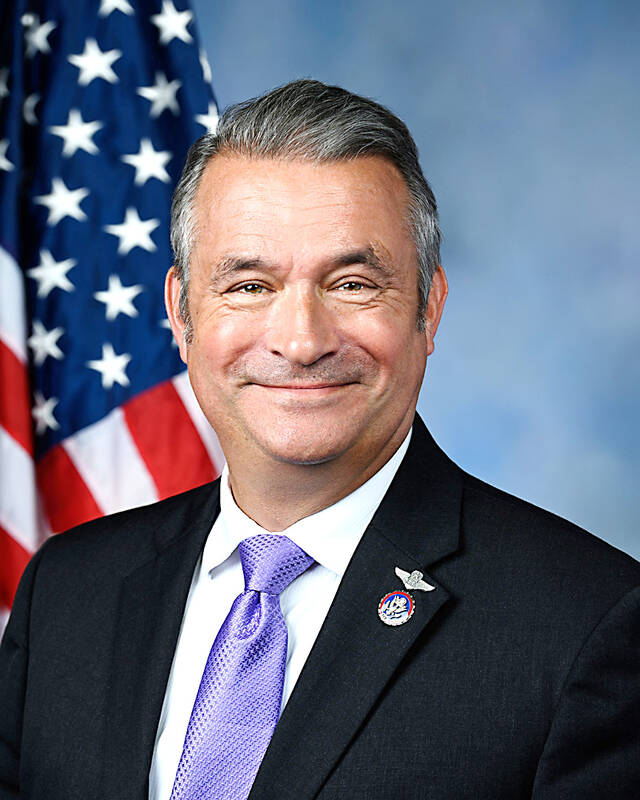US Representative Don Bacon said he is among those whose e-mails were hacked in an espionage campaign that Microsoft Corp has attributed to China.
Bacon, a Republican from Nebraska and a strong advocate for US military support to Taiwan, posted on social media that the FBI had notified him that the Chinese Communist Party (CCP) hacked into his personal and campaign e-mails over the course of a month, from May 15 to June 16.
“The CCP hackers utilized a vulnerability in the Microsoft software, and this was not due to ‘user error,’” he wrote on X, the social media platform formerly known as Twitter.

Photo: US House of Representatives via Reuters.
Bacon, a member of the US House Armed Services Committee, received an e-mail from Microsoft indicating he might have been hacked and advising him to change his password on June 16, said Maggie Sayers, Bacon’s press secretary.
The FBI did not immediately reply to a request for comment.
The Chinese Ministry of Foreign Affairs described claims about the hacking campaign as “false information.”
Bacon posted on X that he would “work overtime” to ensure US weapons sales to Taiwan.
The hack of Bacon’s e-mails was previously reported by the Washington Post.
As for why he was hacked, Bacon wrote: “I stand against the Uighur genocide and abuses in Tibet and Hong Kong. And, I support an independent Taiwan.”
Last month, Microsoft reported that China-based actors gained access to e-mail accounts affecting about 25 organizations including government agencies and consumer accounts of individuals likely associated with these groups.
US Secretary of Commerce Gina Raimondo was among the US officials whose e-mails were breached and the e-mails of Nicholas Burns, US ambassador to China, were also breached, the Wall Street Journal reported.
The US Department of Homeland Security announced that a cybersecurity advisory panel is to investigate malicious targeting of cloud computing environments and Microsoft’s role in the breach.

A preclearance service to facilitate entry for people traveling to select airports in Japan would be available from Thursday next week to Feb. 25 at Taiwan Taoyuan International Airport, Taoyuan International Airport Corp (TIAC) said on Tuesday. The service was first made available to Taiwanese travelers throughout the winter vacation of 2024 and during the Lunar New Year holiday. In addition to flights to the Japanese cities of Hakodate, Asahikawa, Akita, Sendai, Niigata, Okayama, Takamatsu, Kumamoto and Kagoshima, the service would be available to travelers to Kobe and Oita. The service can be accessed by passengers of 15 flight routes operated by

GIVE AND TAKE: Blood demand continues to rise each year, while fewer young donors are available due to the nation’s falling birthrate, a doctor said Blood donors can redeem points earned from donations to obtain limited edition Formosan black bear travel mugs, the Kaohsiung Blood Center said yesterday, as it announced a goal of stocking 20,000 units of blood prior to the Lunar New Year. The last month of the lunar year is National Blood Donation Month, when local centers seek to stockpile blood for use during the Lunar New Year holiday. The blood demand in southern Taiwan — including Tainan and Kaohsiung, as well as Chiayi, Pingtung, Penghu and Taitung counties — is about 2,000 units per day, the center said. The donation campaign aims to boost

ENHANCING EFFICIENCY: The apron can accommodate 16 airplanes overnight at Taoyuan airport while work on the third runway continues, the transport minister said A new temporary overnight parking apron at Taiwan Taoyuan International Airport is to start operating on Friday next week to boost operational efficiency while the third runway is being constructed, the Ministry of Transportation and Communications said yesterday. The apron — one of the crucial projects in the construction of the third runway — can accommodate 16 aircraft overnight at the nation’s largest international airport, Minister of Transportation and Communications Chen Shih-kai (陳世凱) told reporters while inspecting the new facility yesterday morning. Aside from providing the airport operator with greater flexibility in aircraft parking during the third runway construction,

American climber Alex Honnold is to attempt a free climb of Taipei 101 today at 9am, with traffic closures around the skyscraper. To accommodate the climb attempt and filming, the Taipei Department of Transportation said traffic controls would be enforced around the Taipei 101 area. If weather conditions delay the climb, the restrictions would be pushed back to tomorrow. Traffic controls would be in place today from 7am to 11am around the Taipei 101 area, the department said. Songzhi Road would be fully closed in both directions between Songlian Road and Xinyi Road Sec 5, it said, adding that bidirectional traffic controls would